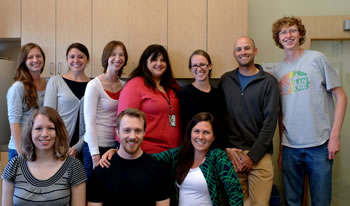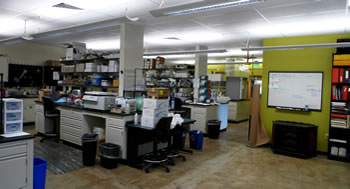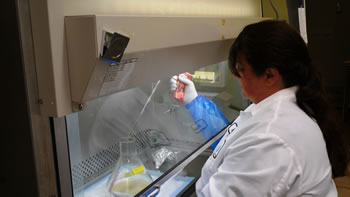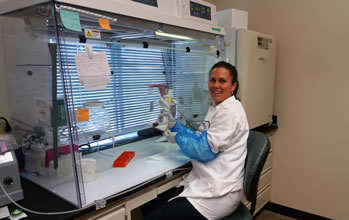The APHI Laboratory
Small Beginnings to Valuable Institute Resource
The APHI laboratory began approximately 25 years ago to enable the continuation of a collaborative research and outreach project between CSU and CDC that aimed to modify an available enzyme-linked immunosorbent assay (ELISA) and conduct validation trials. Today, the APHI laboratory is a centralized resource for faculty and students, as well as local, regional and international collaborators, for applied research and training aimed at improved diagnosis, prevention and control of infectious animal diseases and other important diseases related to animal agriculture, trade, and public health in the United States and abroad. APHI laboratory personnel apply expertise encompassing a broad range of skills and techniques in bacteriology, serology, virology and molecular biology, assay development and optimization.
Basic Research Linked to Population-level Application
Responding to the charge to link basic research findings to the diagnosis and prevention of animal diseases on a population basis, laboratory personnel explored the application of diagnostic and screening tests for important animal diseases in US livestock and wildlife populations. A five-antigen ELISA was developed; validity of the ELISA was determined using several thousand cattle and cervid serum samples. Investigators examined various alternative antigens for their usefulness for the diagnosis of TB in other species. As a result of this work, a multiple-antigen ELISA was found to be very useful as a screening test for TB in elephants.
In addition to a bovine TB screening test validation, a rapid and mass sample testing system was applied for the surveillance of Chronic Wasting Disease (CWD) in US deer. This application used an existing rapid test for Bovine Spongiform Encephalopathy (BSE) in use in Europe and assessed its suitability as a test for CWD. This assessment led to the application of a reliable surveillance system for CWD in several states in the USA. Work within the APHI lab was instrumental in the support of the Institute’s mission to conduct applied animal health research that results in the development of animal health policy for improved decision-making.
Unique Role

APHI Laboratory Personnel
The APHI laboratory continues to be and has been a training site for more than 40 undergraduate, graduate, and post-doctoral students as well as visiting scientists from several countries. These individuals are trained in diverse skills relative to veterinary epidemiology and related fields. Furthermore, student researchers and visiting colleagues receive help from APHI laboratory staff on their research projects. Laboratory assistance varies; some researchers need training in laboratory techniques or help with sample processing. Other researchers require much more, including the development of laboratory methods before beginning their projects.
Current APHI Laboratory Personnel are pictured above. Back row left to right: Paige Tenneson (undergraduate student), Chloe Stenkamp-strahm (PhD/DVM graduate student), Victoria Frank (undergraduate student), Bobbi Magnuson (Research Associate), Clarissa Freemyer (undergraduate student), Craig McConnel (Assistant Professor), Kyle Schroeder (undergraduate student); Front row left to right: Meagan Chriswell (undergraduate student), Sean Montgomery (undergraduate student), Lyndsey Linke (Post-doctoral Research Associate)
Facilities

Main lab space in the APHI Laboratory Building
The APHI Laboratory is housed on the South Campus of Colorado State University in discrete spaces within two neighboring buildings – the APHI Laboratory Building and the Diagnostic Medicine Center (DMC). The combined space is nearly 4,000 square feet and is designed to accommodate a comprehensive range of research activities.
- The APHI Laboratory Building houses basic laboratory operations, personnel, and administrative support. This building contains a main laboratory space, a RNA room, a clean room, a virology room, equipment rooms, a molecular and digital analysis room, and offices for laboratory and administrative support personnel, as well as paperwork/computer stations for students.
- A shared laboratory space within the DMC houses APHI Laboratory operations that are focused on pathogens requiring higher containment, higher throughput bacteriology, and DNA extractions. The DMC laboratory space consists of a main lab area, a DNA room, a bacteriology room, and a freezer room. The work performed within this laboratory benefits from shared resources within the DMC community, which include waste sterilization and disposal and walk-in refrigeration and incubation units.
The APHI Laboratory is well equipped with basic laboratory equipment including but not limited to incubators, refrigeration units and freezers, microscopes with cameras, mixers, pH meters, refrigerated centrifuges, balances – in addition to autoclaves, biosafety cabinets, laminar flow hoods, fume hoods, water ultra purifier, spectrophotometers, a luminometer, fluorometer, Experiontm DNA, RNA, and protein bioanalyzer, a chemiluminscent, fluorescent and visible light digital imager for gel and blot analysis/documentation, automated microplate shaker/incubators and washers, bead mill homogenizers, recirculating water baths, an automated immumagnetic separation machine, as well as a real time PCR machine and conventional thermal cyclers.
Capabilities
- Development and optimization of methods for both antigen and antibody detection
- Development and characterization of hybridoma cell lines
- Development and maintenance of primary cell culture lines
- Development, optimization and/or adaptation of molecular techniques - PCR development and optimization & Extraction of DNA and RNA for pathogen detection from a multitude of sample types
- Utility enhancement of existing tests via adaptation, development and application of optimal methods for processing, testing, and evaluating disease status of conventional/unconventional sample types
- Evaluation and validation of diagnostic test performance
- The goal is to apply rigorous quality control while evaluating and validating tests developed for implementation in a field or laboratory setting, and these investigations set the APHI laboratory apart from the typical diagnostic laboratory or classic molecular research laboratory.
- Bacteriological investigation from clinical samples including but not limited to feces, intestinal contents, nasal and abscess exudates
- Immunomagnetic separations
- Florescent Polarization Assay (FPA)
- Viral propagation and quantitation - Real time PCR - Viral isolation (VIs) - TCID 50
- Development of novel disease prevention strategies, using the associated techniques:
- RNA interference; both in vitro and in vivo
- Transfection, cloning, and plasmid prep and purification
- Bacterial vector invasion assays
- Animal testing and challenge studies (chickens)
- Tissue prep and histological staining
- Flow cytometry and fluorescent microscopy
- Avian influenza experimentation both in vitro and in vivo
- Well-established relationship with CSU Research Foundation to form agreements with industrial partners, including several provisional patent submissions
Current Research Activities
- Determine super-shedding levels and prevalence of E. coli O157 in Colorado dairy cattle. Funding agencies: CSU College Research Council and Infectious Diseases SuperCluster. PI: Craig McConnel
- Identify herd-level risk factors associated with elevated energy metabolites in transition dairy cattle. Funding agency: CSU College Research Council. PI: Jessica McArt
- Validate 3 molecular methods for detection of Mycobacterium TB-complex organisms in elephants utilizing clinical elephant trunk wash samples. Funding agency: CSU College Research Council. PI: Mo Salman
- Inhibiting avian influenza with a novel viral RNAi targeting technology. Funding agency: Infectious Disease Supercluster. PI: Mo Salman, co-PI: Jeff Wilusz
- Validation of a swine influenza virus real-time PCR diagnostic kit for avian influenza virus detection. Funding sponsor: Life Technologies. PI: Kristy Pabilonia
- Assessment of Antimicrobial Resistance in Food Production Animals using Metagenomic Analysis. Funding agencies: CSU Infectious Disease Supercluster; the National Cattleman's Beef Associations (NCBA) Center for Research and Knowledge Management, Beef Safety Research. PI: Paul Morley
- The Detection of Unique Volatile Organic Compounds (VOCs): collaborative project with the USDA and the National Wildlife Research Center. Funding agency: Cooperative Agreement with USDA. PIs: Pauline Nol and Jack Rhyan
Staff
The APHI laboratory is currently staffed with two Research Associates (RAs), and 1 graduate and 1 undergraduate work study student.

Roberta Magnuson
Roberta Magnuson, RA, has a Bachelor of Science in Microbiology from Colorado State University. Areas of expertise include development, optimization and trouble shooting of immunological assays including lateral flow, protein analysis, SDS-PAGE, Western blots, tissue culture, affinity purifications, viral propagation and plaque assays, bacteriological culture, various molecular extraction methods, single, multiplex, reverse transcription and RAPD PCR, animal handling and testing, immunomagnetic separations, manuscript preparation and submission, grant preparation and submission (most recently CRC, IDSC and Morris Animal Foundation), in addition to other areas of expertise as listed above in laboratory capabilities. Ms. Magnuson is trained and certified to work with infectious agents and has over 20 years of laboratory experience, including 14 years dedicated in the APHI lab. Ms. Magnuson has presented research at the Conference of Research Workers in Animal Disease, and the CSU Research Day Symposium, has conducted a workshop in SDS/PAGE analysis and co-conducted a molecular skills and reverse-transcription PCR workshop, and has received training in Emerging Technologies to Enable Quantitative Rapid Tests, and real-time PCR training at the Plum Island Animal Disease Research Center.

Dr. Lyndsey Linke
Lyndsey Linke, PhD, has a Bachelor of Science in Biological Science, a Master of Engineering in Biomedical Engineering, and a PhD in epidemiology in the Department of Clinical Sciences at Colorado State University. Her areas of expertise include development, optimization and trouble shooting of molecular extraction assays, tissue culture, transfection, viral infection/quantification/propagation assays, RT-qPCR, Western blots, ELISAs, immunocytochemistry, DNA and RNA extraction, transformation and cloning, bacteriology and invasion, animal handling and testing, histological prep, flow cytometry, fluorescent microscopy, manuscript preparation and submission, grant preparation and submission (NIH, USDA/AFRI, CRC, IDSC), and statistical analysis. In addition, her list of expertise extends to include all those necessary to conduct the laboratory capabilities listed above and she has proper training and certification to work with infectious agents. Dr. Linke has over 9 years’ experience, with 8 years dedicated in the APHI lab. Dr. Linke has presented research at the Conference of Research Workers in Animal Disease, the CSU Research Day Symposium, and at the American Society for Virology annual conference. She was invited to present at the Tuberculosis in Elephants: Science, Myths and Beyond scientific conference at the USDA, APHIS Center for Animal Welfare in Kansas City, Missouri, where she joined several distinguished speakers in the areas of immunology, diagnostics, epidemiology, treatment, and public health. While at this conference, Dr. Linke presented scientific findings from a recent publication in Journal of Clinical Microbiology to USDA government officials, veterinarians, medical physicians, and other scientific experts in the field of tuberculosis.
